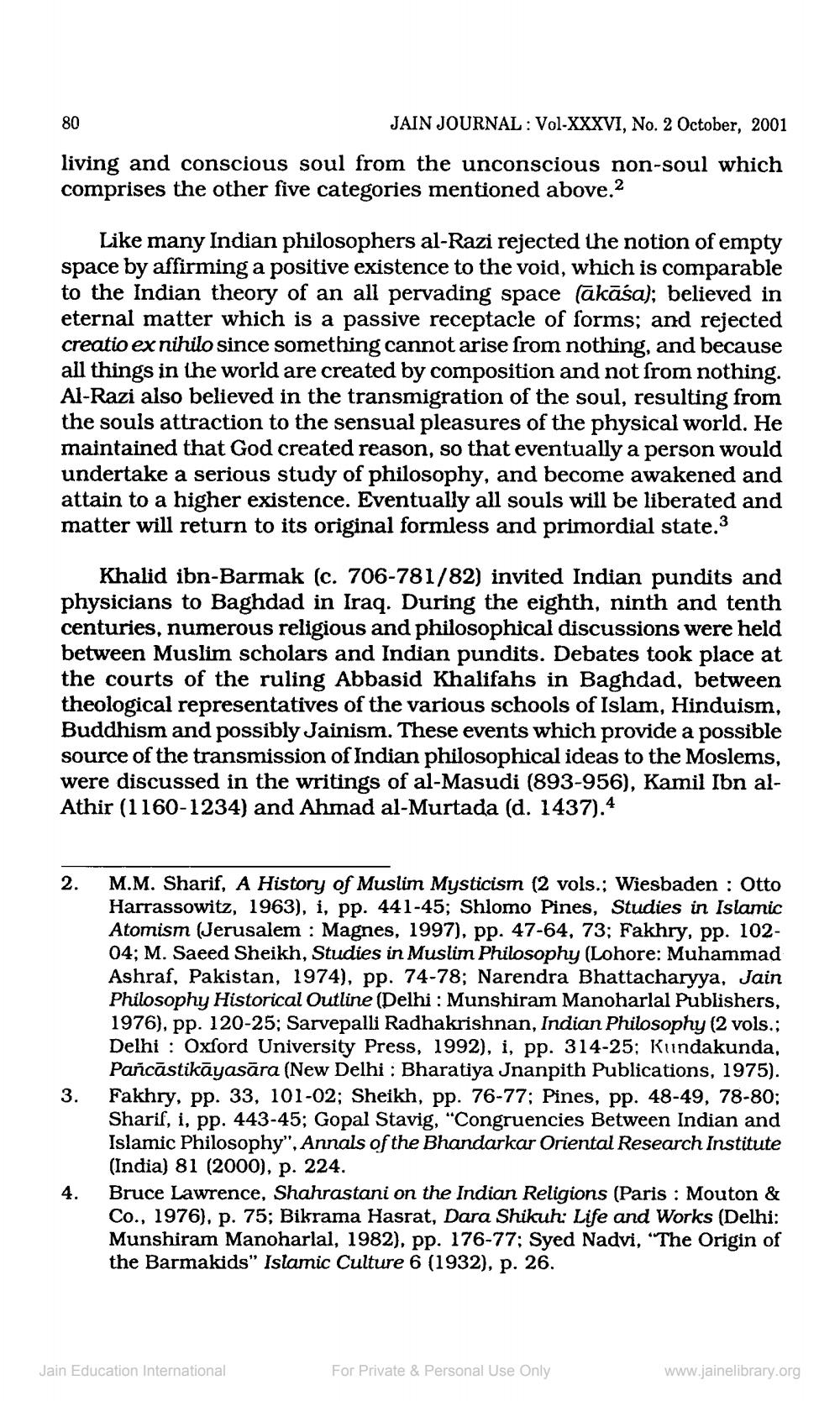________________
JAIN JOURNAL: Vol-XXXVI, No. 2 October, 2001 living and conscious soul from the unconscious non-soul which comprises the other five categories mentioned above.2
80
Like many Indian philosophers al-Razi rejected the notion of empty space by affirming a positive existence to the void, which is comparable to the Indian theory of an all pervading space (ākāśa); believed in eternal matter which is a passive receptacle of forms; and rejected creatio ex nihilo since something cannot arise from nothing, and because all things in the world are created by composition and not from nothing. Al-Razi also believed in the transmigration of the soul, resulting from the souls attraction to the sensual pleasures of the physical world. He maintained that God created reason, so that eventually a person would undertake a serious study of philosophy, and become awakened and attain to a higher existence. Eventually all souls will be liberated and matter will return to its original formless and primordial state.3
Khalid ibn-Barmak (c. 706-781/82) invited Indian pundits and physicians to Baghdad in Iraq. During the eighth, ninth and tenth centuries, numerous religious and philosophical discussions were held between Muslim scholars and Indian pundits. Debates took place at the courts of the ruling Abbasid Khalifahs in Baghdad, between theological representatives of the various schools of Islam, Hinduism, Buddhism and possibly Jainism. These events which provide a possible source of the transmission of Indian philosophical ideas to the Moslems, were discussed in the writings of al-Masudi (893-956), Kamil Ibn alAthir (1160-1234) and Ahmad al-Murtada (d. 1437).4
2. M.M. Sharif, A History of Muslim Mysticism (2 vols.; Wiesbaden: Otto Harrassowitz, 1963), i, pp. 441-45; Shlomo Pines, Studies in Islamic Atomism (Jerusalem: Magnes, 1997), pp. 47-64, 73; Fakhry, pp. 10204; M. Saeed Sheikh, Studies in Muslim Philosophy (Lohore: Muhammad Ashraf, Pakistan, 1974), pp. 74-78; Narendra Bhattacharyya, Jain Philosophy Historical Outline (Delhi: Munshiram Manoharlal Publishers, 1976), pp. 120-25; Sarvepalli Radhakrishnan, Indian Philosophy (2 vols.; Delhi: Oxford University Press, 1992), i, pp. 314-25; Kundakunda, Pañcāstikāyasāra (New Delhi: Bharatiya Jnanpith Publications, 1975). Fakhry, pp. 33, 101-02; Sheikh, pp. 76-77; Pines, pp. 48-49, 78-80; Sharif, i, pp. 443-45; Gopal Stavig, "Congruencies Between Indian and Islamic Philosophy", Annals of the Bhandarkar Oriental Research Institute (India) 81 (2000), p. 224.
3.
4.
Bruce Lawrence, Shahrastani on the Indian Religions (Paris: Mouton & Co., 1976), p. 75; Bikrama Hasrat, Dara Shikuh: Life and Works (Delhi: Munshiram Manoharlal, 1982), pp. 176-77; Syed Nadvi, "The Origin of the Barmakids" Islamic Culture 6 (1932), p. 26.
Jain Education International
For Private & Personal Use Only
www.jainelibrary.org




